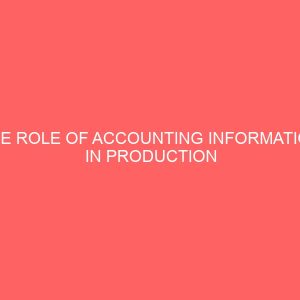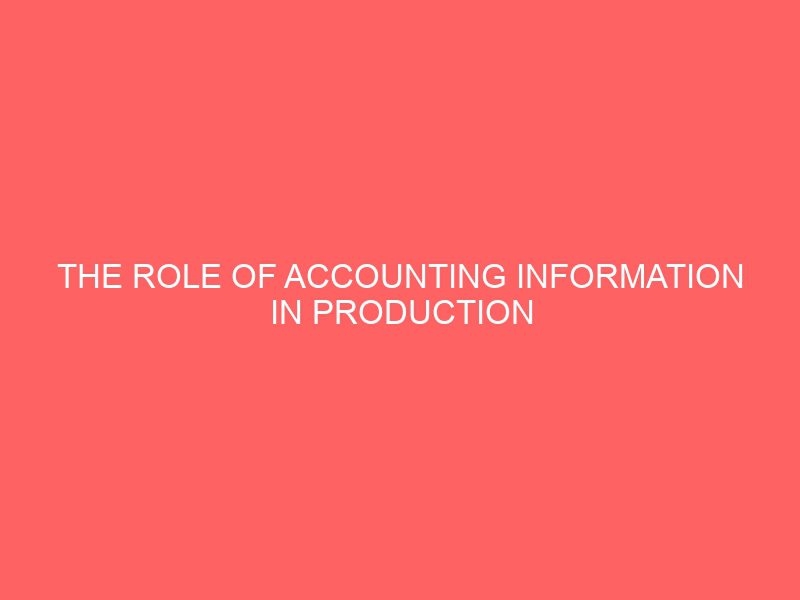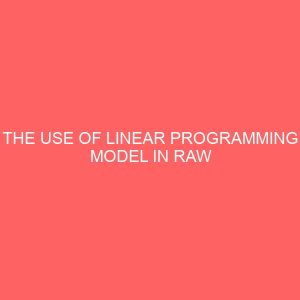Description
THIS RESEARCH WORK IS ON THE ROLE OF ACCOUNTING INFORMATION IN PRODUCTION DECISION – MAKING (A CASE STUDY OF PHINOMAR NIGERIA LIMITED)
ABSTRACT
Managers make decision in order to choose from alternative course of action at a dynamic rate. This is done in order to achieve the set objectives of the firms in which they manage. To make these decisions, accounting information are used as a necessary guide.
Manufacturing firms make use of accounting information which have been complied from source documents, records and statement in accordance with systems. These information gathered are used to make effective production decisions which would achieve the objectives of profit maximization cost minimization, Production efficiency, proper resources allocation etc.
This study is aimed at discovering the quantitative attributes to accounting information which makes it an effective tool in the production decision-making and if the information generated is utilized in effective manner. Although, it is evident that decisions made in manufacturing firms are determined by the accounting information to a varying extent. It is hoped that the recommendations will show the importance of accounting information and that managers who make decision will comprehend it as a vital necessity in decision – making.
TABLE OF CONTENTS Title page
Approval page
Dedication
Acknowledgement
Abstract
List of table
Table of content
CHAPTER ONE: INTRODUCTION
1.1 Introduction
1.2 Statement of the study
1.3 Objectives of the study
1.4 The significance of the study
1.5 Research hypothesis
1.6 Scope and delimitation of the study
1.7 Definition of terms
CHAPTER TWO: REVIEW OF RELATED LITERATURE
2.1 Overview of accounting and information accounting.
2.2 Types of accounting information
2.3 Qualities of accounting information
2.4 The result of proper utilization of Accounting information
2.5 Production decision- making and accounting information
2.6 Characteristics of information
2.7 Types of decision model used in production
2.8 Decision and information characteristics
2.9 Decision- making and accounting information
2.10 Decision models and techniques
CHAPTER THREE: RESEARCH DESIGN AND METHODOLOGY
3.1 Population study
3.2 Sample size
3.3 The research design
3.4 Source of data
CHAPTER FOUR: PRESENTATION AND ANALYSIS OF DATA
4.1 Presentation and analysis of questionnaires
4.2 Test of hypothesis
CHAPTER FIVE: SUMMARY OF FINDINGS, CONCLUSION AND RECOMMENDATION
5.1 Discussion of findings
5.2 Conclusion
5.3 Recommendation
5.4 Limitations of the study
Reference
Appendix
CHAPTER ONE
1.1 INTRODUCTION
Manufacturing firms in the present economy have to contend with a lot of economic variables which have been aimed at consolidating the gains of structure (adjustment programmes (S A P) since the first step introduced by SAP was self reliance, most manufacturing forms have had to consider the local sourcing of raw materials instead of the dependency on imported materials for their production processes. Other factors such as inflation, taxation, instability both economic and political, competition and market forces have caused a change in the out look of production.
In order to achieve their objectives the manufacturing firms have to make concise decision which would be relevant to the restricting of production processes and in profit maximization so as to survive in our ever- changing








Reviews
There are no reviews yet.